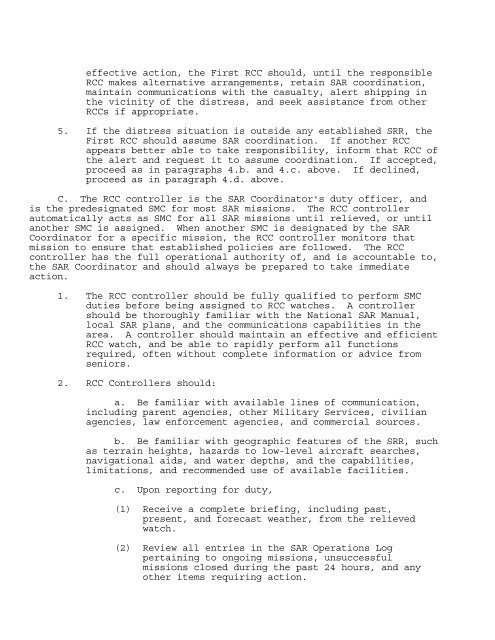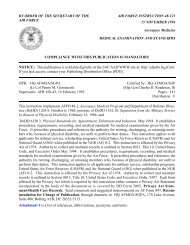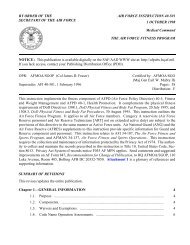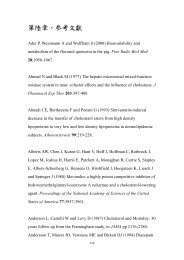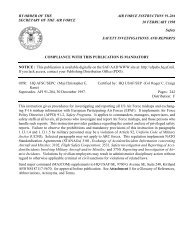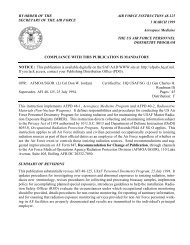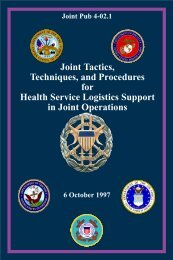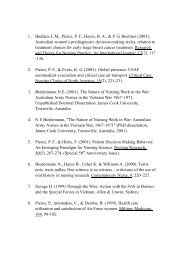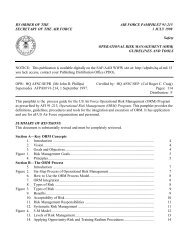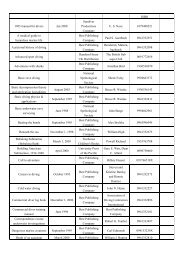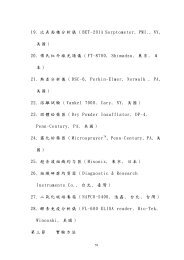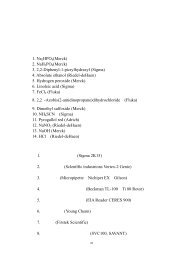- Page 1 and 2: JOINT PUB 3-50 NATIONAL SEARCH AND
- Page 3 and 4: e. Update of information and graph
- Page 5 and 6: PREFACE Volume I: National Search a
- Page 7 and 8: . Joint Pub 3-50.1/COMDTINST M16120
- Page 9 and 10: ABBREVIATIONS/ACRONYMS A Search Are
- Page 11 and 12: COSPAS Cosmicheskaya Sistyema Poisk
- Page 13 and 14: FIS Flight Information Service FIXe
- Page 15 and 16: MAC Military Airlift Command MARAD
- Page 17 and 18: PMC Parallel Multiunit Circle PMN P
- Page 19 and 20: TFR Temporary Flight Restriction TL
- Page 21 and 22: CHAPTER 1. SAR SYSTEM AND ORGANIZAT
- Page 23 and 24: consolidates the information needed
- Page 25 and 26: } Figure 1-2. United States Search
- Page 27 and 28: Commander, 9th Coast Guard District
- Page 29 and 30: 131 The SAR Coordinator SC | SMC |
- Page 31: 1. The shore station nearest the re
- Page 35 and 36: . A Wreckage Locator File with all
- Page 37 and 38: directories, SMC planning and docum
- Page 39 and 40: on scene conditions advising the SM
- Page 41 and 42: lifeboats or liferafts, oil slicks,
- Page 43 and 44: CHAPTER 2. SAR ORGANIZATIONS, AGENC
- Page 45 and 46: Ship SAR Manual (MERSAR) contains p
- Page 47 and 48: messages addressed to CIRM Roma. 2.
- Page 49 and 50: for SAR. 1. National Oceanic and At
- Page 51 and 52: snowmobiles, scuba teams, and track
- Page 53 and 54: surface SRUs can arrive. a. SAR hel
- Page 55 and 56: 3. Maneuverability is necessary for
- Page 57 and 58: has an ailing seaman, and can rescu
- Page 59 and 60: manning and configuration. Larger v
- Page 61 and 62: physical training, skill in communi
- Page 63 and 64: special qualifications desirable in
- Page 65 and 66: Overseas Region the Alaskan CAP Win
- Page 67 and 68: platform. Also of use for SAR are c
- Page 69 and 70: 3130.16 series. The SMC should de-a
- Page 71 and 72: continental U.S. and at offshore lo
- Page 73 and 74: the potential for recording data wi
- Page 75 and 76: other craft or radio stations: 1. A
- Page 77 and 78: EPIRBs. 9. 27.065 kHz (Citizens Ban
- Page 79 and 80: vessels) will be required to carry
- Page 81 and 82: . Non-compliance with FCC Rules and
- Page 83 and 84:
9. SART. 10. MF DSC, used to initia
- Page 85 and 86:
4. FAA Domestic Teletype Networks,
- Page 87 and 88:
3023 kHz (USB), 123.1 MHz, and 282.
- Page 89 and 90:
3. 2638 kHz, all areas. 4. 2738 kHz
- Page 91 and 92:
SRUs and agencies. A search action
- Page 93 and 94:
2. Rescue Area f. SRUs on scene a.
- Page 95 and 96:
extended time, a Notice to Mariners
- Page 97 and 98:
The receiving and recording of info
- Page 99 and 100:
case. The SMC is often automaticall
- Page 101 and 102:
any source. b. There is suspicion t
- Page 103 and 104:
The craft's float or flight plan is
- Page 105 and 106:
Figure 4-1. Water Chill Without Ant
- Page 107 and 108:
s Figure 4-2. Wind Chill Graph - Eq
- Page 109 and 110:
445 Weather A. Weather may limit SA
- Page 111 and 112:
451 Uncertainty Phase An Emergency
- Page 113 and 114:
471 PRECOM A. PRECOM search contact
- Page 115 and 116:
the objective during their normal o
- Page 117 and 118:
effective search plan. The plan may
- Page 119 and 120:
D. Other SAR planning models, such
- Page 121 and 122:
1. The aircraft glide area shown in
- Page 123 and 124:
Figure 5-3. Vector Plots of Surface
- Page 125 and 126:
TABLE 5-1. Parachute Drift Distance
- Page 127 and 128:
the search object has, the greater
- Page 129 and 130:
B. Sea Current (SC) is the residual
- Page 131 and 132:
Figure 5-6A. Wind Current - North L
- Page 133 and 134:
large lake can vary with season, we
- Page 135 and 136:
5. Other on scene observations can
- Page 137 and 138:
520 SEARCH AREA Figure 5-8. Minimax
- Page 139 and 140:
Figure 5-9. Drift Error by Minimax
- Page 141 and 142:
DRe to determine SRU error (Y = Fix
- Page 143 and 144:
Figure 5-11. Search Areas - Moving
- Page 145 and 146:
E. When only a datum area exists, s
- Page 147 and 148:
SRUs are dispatched next. Supplemen
- Page 149 and 150:
B. POD can be increased by decreasi
- Page 151 and 152:
C. Visual sweep widths are determin
- Page 153 and 154:
TABLE 5-6. Visual Sweep Width Estim
- Page 155 and 156:
9. Fatigue. Degradation of detectio
- Page 157 and 158:
Table 5-8. Height of Eye vs. Horizo
- Page 159 and 160:
6. Sweep widths for Side-Looking Ai
- Page 161 and 162:
TABLE 5-11a. Sweep Widths for Forwa
- Page 163 and 164:
Sweep widths should be approximated
- Page 165 and 166:
TABLE 5-14. Environmental Limitatio
- Page 167 and 168:
Figure 5-19. Maritime Probability o
- Page 169 and 170:
again, unless it is determined furt
- Page 171 and 172:
c. This track spacing may exceed th
- Page 173 and 174:
a. E-7 corners 23 15N 74 35W to 23
- Page 175 and 176:
E. Orienting Search Areas Search pa
- Page 177 and 178:
Figure 5-21. Typical Assignments fo
- Page 179 and 180:
The major pattern characteristic is
- Page 181 and 182:
Figure 5-26. Figure 5-27. 3. Parall
- Page 183 and 184:
Figure 5-31. Figure 5-32. D. Creepi
- Page 185 and 186:
area, they must fly their individua
- Page 187 and 188:
for large objects in well-defined s
- Page 189 and 190:
I. Homing Patterns (H) are used to
- Page 191 and 192:
completed, the initial area, not th
- Page 193 and 194:
Pattern Name SRU required Remarks T
- Page 195 and 196:
560 PLANNING OF ON SCENE COORDINATI
- Page 197 and 198:
NOTAM for non-SAR aircraft to remai
- Page 199 and 200:
described as previously discussed,
- Page 201 and 202:
procedures for aircraft SRUs should
- Page 203 and 204:
1. Where sea current, tidal current
- Page 205 and 206:
eturn to base. E. Continuous attent
- Page 207 and 208:
to minimize clutter. While this is
- Page 209 and 210:
642 Aircraft Search A. Overwater Se
- Page 211 and 212:
one leg to the next without the nee
- Page 213 and 214:
everses course. The course on which
- Page 215 and 216:
645 Scanning Figure 6-5. Search for
- Page 217 and 218:
Figure 6-6. Marine SRU Crossleg Fig
- Page 219 and 220:
a. The effects of time on task vary
- Page 221 and 222:
Figure 6-9. Range Estimation 6-12
- Page 223 and 224:
5. Scanners forced to look into the
- Page 225 and 226:
645 Search Target This effect can b
- Page 227 and 228:
Figure 6-12. Effects of Altitude on
- Page 229 and 230:
Figure 6-16. Factors in Radar Detec
- Page 231 and 232:
C. Multisensor search is either mul
- Page 233 and 234:
Figure 6-18. INS Pattern for Reloca
- Page 235 and 236:
1. Initial sighting--Drop smoke and
- Page 237 and 238:
altitude to make the sighting repor
- Page 239 and 240:
lue and white checkered flag), or s
- Page 241 and 242:
Rescue planning involves dispatchin
- Page 243 and 244:
pararescue teams can place medicall
- Page 245 and 246:
Speed and ability to sustain surviv
- Page 247 and 248:
1. Sustaining life. Immediately upo
- Page 249 and 250:
other factors affecting rescue. 742
- Page 251 and 252:
Figure 7-2. Helicopter Racetrack Es
- Page 253 and 254:
2. Rations packs - concentrated or
- Page 255 and 256:
753 Rescue by Ship diverting or dis
- Page 257 and 258:
than 6 feet (2 meters) apart, inter
- Page 259 and 260:
800 General 810 Aircraft Searches 8
- Page 261 and 262:
TABLE 8-1. Inland Probability of De
- Page 263 and 264:
strength of the wind and steepness
- Page 265 and 266:
the area of greatest turbulence, an
- Page 267 and 268:
823 Air/Ground Coordination An SMC,
- Page 269 and 270:
2. A team leader is responsible for
- Page 271 and 272:
Figure 8-4. PM Search Pattern for L
- Page 273 and 274:
the track spacing would be 100 feet
- Page 275 and 276:
1. Scale 1:24,000 is the best for l
- Page 277 and 278:
Figure 8-6. Ground Search Area Plot
- Page 279 and 280:
unlaundered carefully preserved sce
- Page 281 and 282:
5. As indicated previously, it is i
- Page 283 and 284:
debriefing, transport to a delivery
- Page 285 and 286:
complete mental collapse due to the
- Page 287 and 288:
medical training, qualifications, a
- Page 289 and 290:
1000 General 1010 Mission Suspensio
- Page 291 and 292:
accept that the search cannot conti
- Page 293 and 294:
used for statistical analysis, syst
- Page 295 and 296:
Each RCC maintains a chronological
- Page 297 and 298:
aircraft that they are near the sce
- Page 299 and 300:
(day or night), date, search area a
- Page 301 and 302:
1200 General 1210 Domestic Framewor
- Page 303 and 304:
G. 46 USC 2304 requires a master or
- Page 305 and 306:
differing requirements of each coun
- Page 307 and 308:
RCC, which will plan the search and
- Page 309 and 310:
commander and the Department of Sta
- Page 311 and 312:
1240 PRIVATE PROPERTY 1241 Entering
- Page 313 and 314:
CHAPTER 13. SAR MISSION PUBLIC RELA
- Page 315 and 316:
equests for information, and use ne
- Page 317 and 318:
1323 News and Photograph Pool A new
- Page 319 and 320:
GLOSSARY A-probability: Percentage
- Page 321 and 322:
Awareness Range: Distance at which
- Page 323 and 324:
3. Ratio of sweep width to track sp
- Page 325 and 326:
Recorded data is retained for 15 da
- Page 327 and 328:
Inadvertent Alarm Rate: Ratio of in
- Page 329 and 330:
Military Assistance to Safety and T
- Page 331 and 332:
Probability of Detection (POD): The
- Page 333 and 334:
Search Action Plan: Message, normal
- Page 335 and 336:
SRU Error (Y): Search craft error b
- Page 337 and 338:
composed of significant assigned co
- Page 339 and 340:
Hydrographic Office. H.O. Pub 100.
- Page 341 and 342:
Emergency Response Institute. Helic
- Page 343 and 344:
University of Hawaii. Studies on Hu
- Page 345 and 346:
List of Ship Stations. Geneva, Swit
- Page 347 and 348:
1. POLICY APPENDIX A. NATIONAL SEAR
- Page 349 and 350:
use of wire and radio facilities fo
- Page 351 and 352:
Area for the advantageous execution
- Page 353 and 354:
maintain liaison with and support e
- Page 355 and 356:
Figure A-1. United States Search an
- Page 357 and 358:
air SAR units, and provide guidance
- Page 359 and 360:
far as possible, afford adequate me
- Page 361 and 362:
which shall act in close and contin
- Page 363 and 364:
established by the Convention on In
- Page 365 and 366:
December 12, 1986 Agreement Concern
- Page 367 and 368:
outstretched to each side. j. Inver
- Page 369 and 370:
Black or white smoke bursts, 10 sec
- Page 371 and 372:
Figure C-2. Surface-Air Visual Sign
- Page 373 and 374:
Figure C-5. Panel Signals C-5
- Page 375 and 376:
to the 26-foot sailboat row to obta
- Page 377 and 378:
straightaway length (x) of the cros
- Page 379 and 380:
These patterns are variations of th
- Page 381 and 382:
c. In the CSR pattern, the actual c
- Page 383 and 384:
adjacent to it, are the following:
- Page 385 and 386:
d. If the shaded portions of Figure
- Page 387 and 388:
3. Relative motion pattern solution
- Page 389 and 390:
through the tail of the ship's vect
- Page 391 and 392:
Request the aircraft to report amou
- Page 393 and 394:
information, TACAN/DME ranging disp
- Page 395 and 396:
APPENDIX F. TEMPORARY FLIGHT RESTRI
- Page 397 and 398:
4. Normally, incidents in an aircra
- Page 399 and 400:
LIST OF EFFECTIVE PAGES Subject Mat


